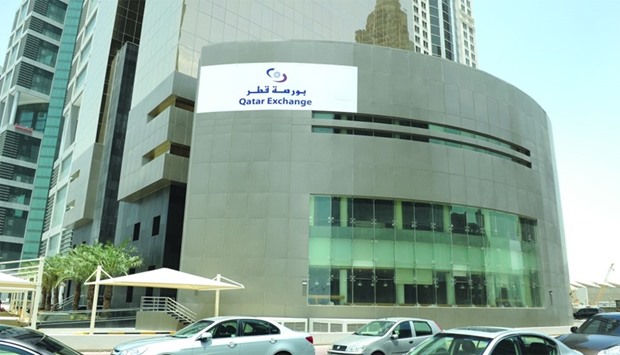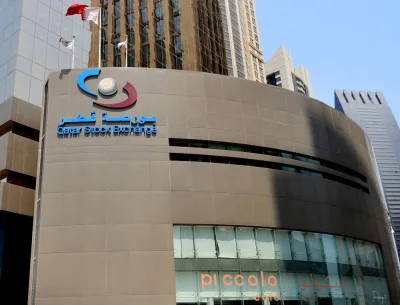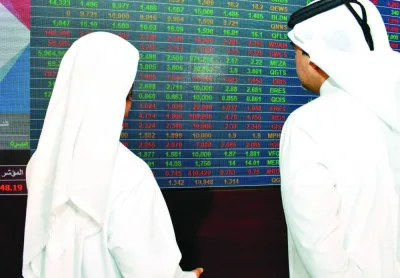An across the board buying – particularly in telecom, industrials, transport and realty – led the 20-stock Qatar Index soar 1.79% during the week which saw a large Gulf pension fund evince interest in investing in QSE.
Buying interests were skewed towards large cap segments during the week which saw Woqod disclose net profit of QR883.11mn in 2016.
Kuwait had recorded 3.67% gains, Saudi Arabia (2.32%), Abu Dhabi (1.61%), Bahrain (1.29%) and Muscat (0.41%), while Dubai fell 0.87% during the week which witnessed Qatar General Insurance and Reinsurance (QGRI) report QR219.3mn net profit in 2016.
QSE’s year-to-date gains were seen at 3.67% compared to 18.73% in Kuwait, 8.46% in Bahrain, 3.4% in Dubai, 2.13% in Abu Dhabi and 1.04% in Muscat; whereas Saudi Arabia shrank 1.1%.
Islamic stocks outperformed the main index and other indices during the week which saw Qatar Islamic Insurance’s 2016 net profit at QR63.5mn.
Nevertheless, domestic institutions turned bearish and there was increased net selling from local retail investors during the week which saw Qatar First Bank (QFB) sell a part of its 10.5% stake in a healthcare service provider, established in Dubai.
Overall trade turnover rose amid fall in volumes during the week which saw real estate, telecom, banking, insurance and consumer goods sectors together account for more than 88% of the volumes.
In volumes, realty constituted 27% of the total, followed by banks and financial services and telecom (19% each), consumer goods (12%), insurance (11%), industrials (8%) and transport (4%) during the week which saw Doha Bank group chief executive Dr. R Seetharaman view that Qatar has potential for $10bn to $15bn overseas funds inflow since its upgrade to emerging market but it, like other Gulf countries, has been "grossly underestimated" by global investors.
In value, banks and financial services’ share was 25%, followed by real estate (19%), consumer goods (16%), insurance (15%), industrials (13%), telecom (7%) and transport (4%) during the week which witnessed Seetharaman also say Qatar's banking industry is set to witness deposits outpace credit off-take this year.
Opening the week strong at 10,663 points, the market continued to gain for the rest of the sessions with spikes in the last two days to collectively amass 190 points to settle at 10,819 points during the week.
The 20-stock Total Return Index gained 1.79%, All Share Index (comprising wider constituents) by 1.63% and Al Rayan Islamic Index by 2.16% during the week which saw the Institute of International Finance view that the Gulf region is expected to maintain its currency peg with the US dollar despite "significant" appreciation in the real effective exchange rate, which partly could pose challenge for the non-oil activity.
The telecoms sector saw its index soar 5.48%, industrials (1.95%), transport (1.85%), realty (1.83%), banks and financial services (1.21%), consumer goods (0.67%) and insurance (0.45%) during the week, which saw Barwa, QGRI and Masraf Al Rayan dominate the trading ring in terms of volume and value.
Market capitalisation expanded 1.84% to QR579.41bn as large, small and midcap equities gained 1.93%, 1.24% and 0.57% respectively, while microcaps fell 0.32% during the week.
Large, small and microcap stocks have reported year-to-date gains of 3.97%, 2.96% and 2.36% respectively; whereas midcaps were flat.
Of the 44 stocks, as many as 27 rose, while 16 fell and one was unchanged. Seven of the 13 banks and financial services, six of the eight industrials, four of the nine consumer goods, three each of the five insurers, the four real estate and the three transport, and one of the two telecom stocks closed higher during the week.
More than 61% of the stocks extended gains with major movers being Ooredoo, Industries Qatar, Gulf International Services, Barwa, Gulf Warehousing, Al Khaleej Takaful, Qatar Islamic Insurance, Masraf Al Rayan, al khaliji, Islamic Holding Group, Nakilat and Medicare Group during the week.
Nevertheless, Dlala, Alijarah Holding, QGRI, Zad Holding, Woqod, Commercial Bank, Qatar Electricity and Water, QFB, Vodafone Qatar and Widam Food were among the losers during the week.
Foreign institutions’ net buying increased substantially to QR152.04mn compared to QR6.96mn the week ended February 9.
Non-Qatari individual investors’ net buying also strengthened considerably to QR122.04mn against QR2.32mn the previous.
However, domestic institutions turned net sellers to the tune of QR182.59mn compared with net buyers of QR11.86mn the week ended February 9.
Local retail investors’ net profit booking increased perceptibly to QR78.1mn against QR21.14mn the previous week.
Total trade volume fell 16% to 36.25mn shares, while value rose 4% to QR1.34bn but on 2% decline in transactions to 17,054 during the week.
There was 39% plunge in the telecom sector’s trade volume to 6.89mn equities, 29% in value to QR98.15mn and 14% in deals to 1,331.
The industrials sector’s trade volume plummeted 27% to 2.84mn stocks, value by 4% to QR170.25mn and transactions by 8% to 3,070.
The real estate sector reported 26% shrinkage in trade volume to 9.96mn shares, 20% in value to QR259.48mn and 14% in deals to 3,401.
The transport sector’s trade volume tanked 25% to 1.33mn equities, while value gained 2% to QR59.35mn and transactions by 6% to 838.
The banks and financial services sector saw 17% decline in trade volume to 6.79mn stocks, 14% in value to QR336.27mn and 6% in deals to 4,805.
However, the insurance sector’s trade volume more than quadrupled to 4.25mn shares and value almost tripled to QR200.94mn 76% jump in transactions to 1,094.
The consumer goods sector’s trade volume shot up 20% to 4.19mn equities, value by 60% to QR215.17mn and deals by 22% to 2,515.
In the debt market, there was no trading of treasury bills and government bonds during the week.

An across the board buying u2013 particularly in telecom, industrials, transport and realty u2013 led the 20-stock Qatar Index soar 1.79% during the week which saw a large Gulf pension fund evince interest in investing in QSE.
Stronger buying from foreign institutions and retail investors lifted confidence in the Qatar Stock Exchange (QSE), which saw its index gain 190 points and capitalisation expand QR10bn during the week.



